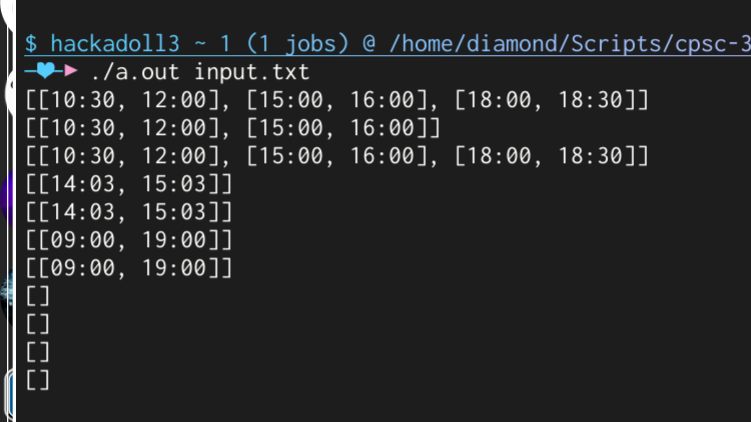CPSC 335 -- Project 1
- Name: Diamond Dinh
- Email: diamondburned@csu.fullerton.edu
- Repository: https://github.com/diamondburned/cpsc-335-project1
Note: The solution is implemented in
problem_solve.cpp.
Build
makeRun
./a.out input.txt > output.txtThe output should look like this (with the first output being the example one):
Proof
Define the following structures:
class TimeSlot:
startTime: int # minimum 0, maximum 1440
endTime: int # minimum 0, maximum 1440
class Person:
busySchedule: List[TimeSlot]
workHours: TimeSlotDefine the following variables:
people: List[Person]
meetingDuration: int # minimum 0, maximum 1440It is worth mentioning that the startTime and endTime will never be
greater than 1440, since there are only 1440 minutes in a day.
Let:
-
$n$ be the number of people, -
$m$ be the number of busy times per person, and -
$d$ be the number of minutes in a day (24 * 60).
First, we will prove that
Next, we will prove that
Note that generate_worstcase generates a worst case scenario where
Finally, we will prove that
We can then implement the algorithm as follows:
# 4 steps
minutesPerDay = 24 * 60
busyMinutes = [False] * minutesPerDay
latestStartTime = 0
earliestEndTime = minutesPerDay
# n*inner steps
for person in people:
# 2 steps
latestStartTime = max(latestStartTime, person.workHours.startTime)
earliestEndTime = min(earliestEndTime, person.workHours.endTime)
# m*inner steps
for busyTime in person.busySchedule:
# d*inner steps
for minute in range(busyTime.startTime, busyTime.endTime):
# 1 step
busyMinutes[minute] = True
# d*1 steps
# d steps
# 2 + m*d steps
# n*(2 + m*d) steps
# 1 step
freeTimes = []
# 1 step
start = None
# d*inner steps
for minute in range(latestStartTime, earliestEndTime + 1):
# 2 steps + max(inner1, inner2) steps
if minute < earliestEndTime and not busyMinutes[minute]:
# 1 step
if start is None:
# 1 step
start = minute
# 2 steps
else:
# 2 steps
if start is not None and (minute - start) >= meetingDuration:
# 1 step
freeTimes.append((start, minute))
# 1 step
start = None
# 4 steps
# 2 + max(4, 1) steps
# 2 + 4 steps
# 6 steps
# d*6 steps
return freeTimesNote that for range(busyTime.startTime, busyTime.endTime) can be rewritten
to the following:
for minute in range(0, 1440):
if minute < busyTime.startTime or minute >= busyTime.endTime:
continue
# ...Which would make the loop run for 1440 times, showing that the loop runs in
Adding up the steps, we get:
Given the above step count of the algorithm, we arrive at 2 different possible conclusions:
- If we consider
$m$ to be a constant (due to a known maximum value), the algorithm runs in$\text{O}(n)$ time. - If we consider
$m$ to be a variable, the algorithm runs in$\text{O}(n^2)$ time.
Note that
